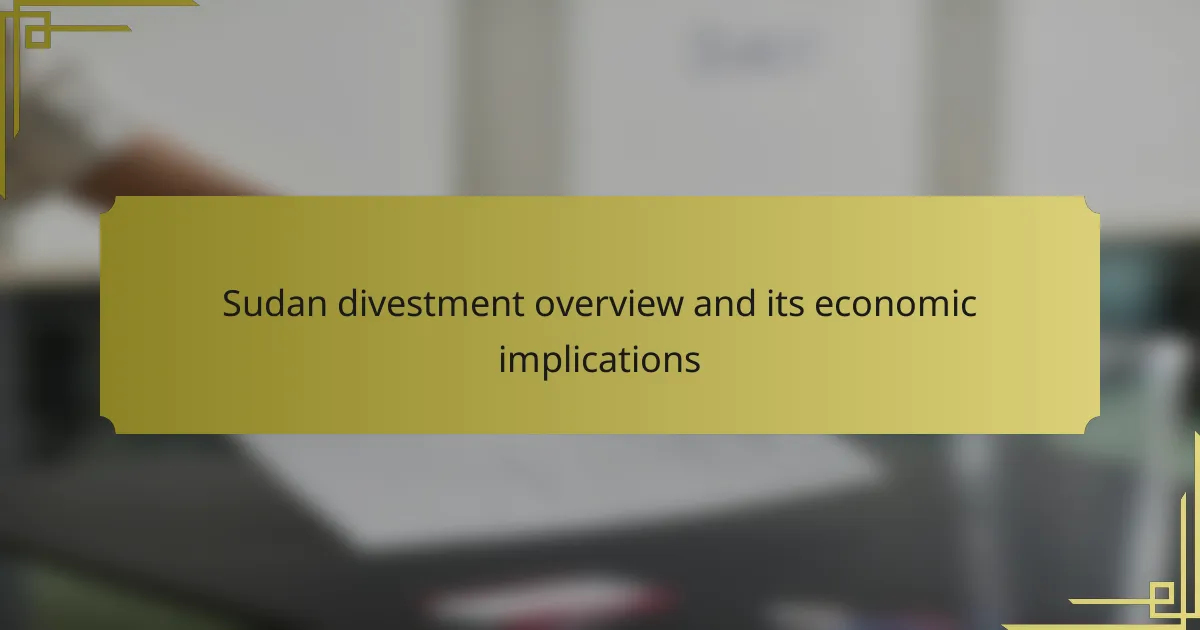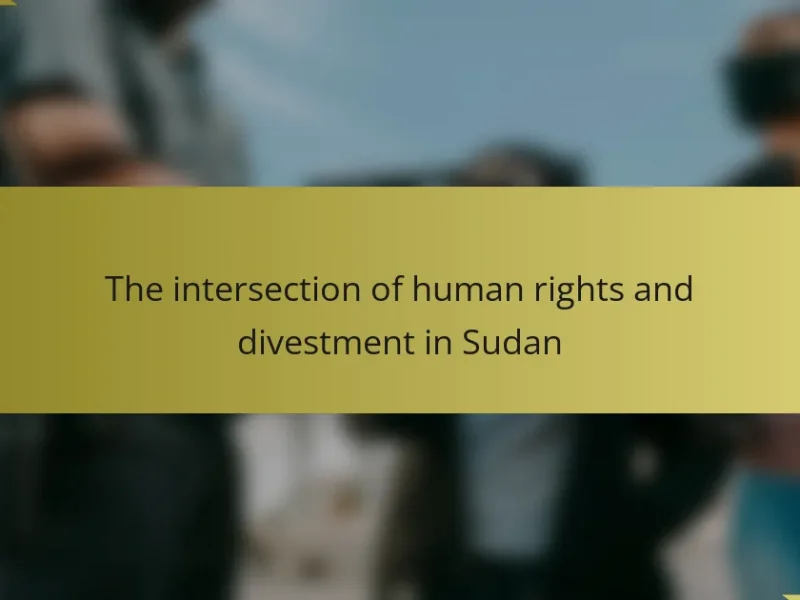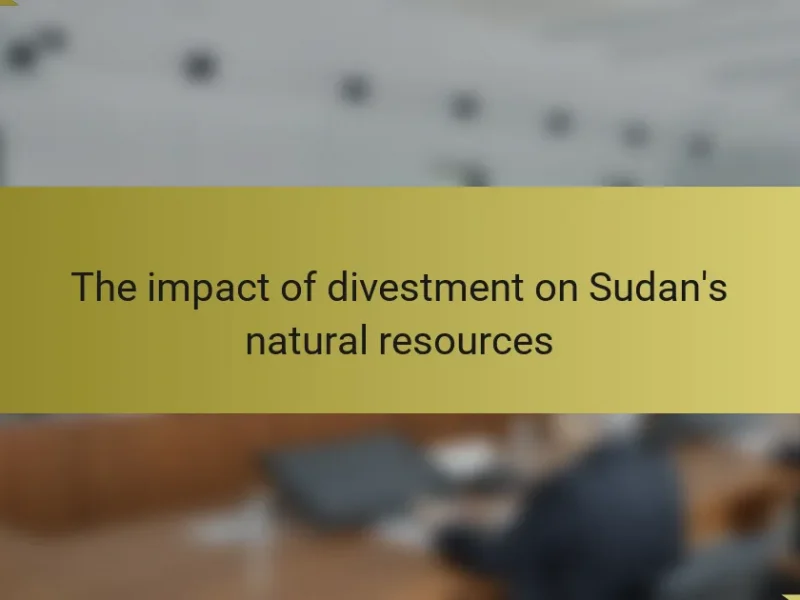Sudan divestment refers to the withdrawal of investments from companies operating in Sudan, primarily driven by concerns over human rights violations by the Sudanese government. This movement gained prominence during the Darfur conflict, leading to the enactment of the U.S. Sudan Divestment Act in 2006, which encouraged states and institutions to divest from companies associated with the government. The economic implications of Sudan divestment are significant, resulting in reduced foreign investment, job losses, and increased reliance on domestic resources. Additionally, divestment can contribute to inflation and currency devaluation, leading to broader economic instability and historical parallels with other countries facing similar sanctions and divestment actions.

What is Sudan divestment?
Sudan divestment refers to the withdrawal of investments from companies operating in Sudan. This action is often taken in response to concerns about human rights violations in the country. Many organizations and individuals choose to divest as a form of protest against the Sudanese government’s actions. For instance, the divestment movement gained momentum due to the Darfur conflict, which drew international condemnation. In 2006, the U.S. enacted the Sudan Divestment Act, encouraging states and institutions to divest from companies linked to the Sudanese government. This legislative move aimed to pressure the government to change its policies. Consequently, divestment is viewed as a strategy to promote social and political change in Sudan.
How did Sudan divestment come into existence?
Sudan divestment emerged as a response to human rights violations and conflicts in Sudan. The situation intensified in the early 2000s during the Darfur conflict. Activists and organizations advocated for economic pressure on the Sudanese government. They aimed to compel changes in policies through divestment strategies. In 2006, the Sudan Divestment Task Force was established to guide these efforts. Various states and universities began to divest from companies operating in Sudan. This movement gained momentum with public awareness and activism. By 2010, numerous institutions had adopted divestment policies, impacting Sudan’s economy significantly.
What historical events led to the call for divestment from Sudan?
The call for divestment from Sudan was primarily driven by the Darfur conflict. This conflict began in 2003, marked by violence against civilians. The Sudanese government, alongside militia groups, was accused of committing genocide. Reports indicated widespread atrocities, including mass killings and displacement of populations. In 2005, the United Nations estimated that over 200,000 people had died due to the conflict. Humanitarian crises escalated, prompting international outrage. In response, various organizations and governments initiated divestment campaigns. These campaigns aimed to pressure the Sudanese government to cease its violent actions. The divestment movement gained momentum as awareness of the situation increased globally.
What are the key organizations involved in advocating for Sudan divestment?
Key organizations advocating for Sudan divestment include the Sudan Divestment Task Force, Amnesty International, and Human Rights Watch. The Sudan Divestment Task Force focuses on mobilizing investors to withdraw from companies supporting the Sudanese government. Amnesty International campaigns against human rights abuses in Sudan and promotes divestment as a strategy. Human Rights Watch documents violations in Sudan and encourages corporations to cease operations linked to the government. These organizations provide reports and resources to support their advocacy efforts. Their work aims to pressure the Sudanese government to improve human rights conditions.
Why is Sudan divestment significant?
Sudan divestment is significant because it aims to impact the country’s political and economic landscape. By withdrawing investments, stakeholders signal disapproval of the Sudanese government’s actions. This pressure can lead to changes in policies or behaviors. Historical context shows that divestment has been effective in other regions. For instance, divestment campaigns against apartheid in South Africa resulted in significant political shifts. Additionally, divestment can influence global perceptions of Sudan. It may deter foreign investment, affecting the economy. This creates a ripple effect, impacting local communities and governance. Overall, Sudan divestment serves as a tool for advocacy and accountability.
How does divestment impact Sudan’s economy?
Divestment negatively impacts Sudan’s economy by reducing foreign investment. When companies withdraw their investments, it leads to decreased capital inflow. This results in lower economic growth and job losses. The Sudanese government faces budgetary constraints due to reduced tax revenues. Essential services and infrastructure development suffer as a consequence. Historical data shows that divestment in the oil sector led to a significant decline in production and revenue. The International Monetary Fund reported that Sudan’s GDP contracted following major divestment actions. Overall, divestment creates a cycle of economic decline and instability in Sudan.
What are the moral and ethical considerations surrounding Sudan divestment?
The moral and ethical considerations surrounding Sudan divestment include the impact on human rights and economic stability. Divestment aims to pressure the Sudanese government to improve its human rights record. Activists argue that continuing investments support oppressive regimes. This raises ethical questions about corporate responsibility and complicity in human rights violations. Conversely, critics of divestment claim it may harm ordinary citizens economically. They argue that divestment could lead to job losses and reduced access to essential services. Balancing these concerns is complex. Historical context shows that divestment movements have succeeded in raising awareness but have mixed results in achieving change.
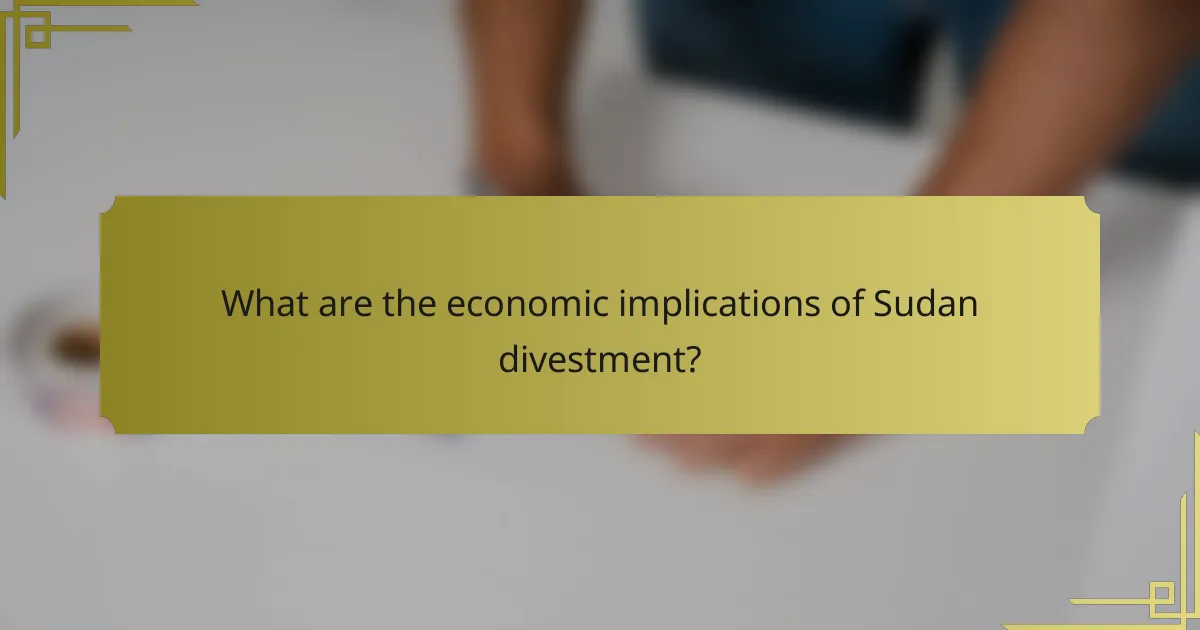
What are the economic implications of Sudan divestment?
Sudan divestment leads to significant economic implications for the country. The withdrawal of foreign investments reduces capital inflow, which can stifle economic growth. This divestment often results in job losses, as companies pull out and local businesses suffer from decreased demand. Additionally, it can lead to a decline in essential services, as funding for infrastructure and public services diminishes.
The economic sanctions imposed alongside divestment exacerbate these issues, limiting Sudan’s access to international markets. As a result, the country may experience increased inflation and currency devaluation. Historical examples include the impact of divestment during the Darfur conflict, where foreign companies exited, leading to economic isolation.
In summary, the economic implications of Sudan divestment are multifaceted, affecting growth, employment, and overall stability.
How does divestment affect foreign investment in Sudan?
Divestment negatively impacts foreign investment in Sudan. When investors withdraw their capital, it creates uncertainty in the market. This uncertainty leads to decreased investor confidence. Consequently, foreign investors are less likely to engage in Sudanese markets. Historical data shows that significant divestment events have correlated with drops in foreign direct investment. For instance, after the imposition of sanctions in the early 2000s, foreign investment in Sudan decreased sharply. The lack of investment hinders economic growth and development in the country. Overall, divestment creates a cycle of reduced investment and economic stagnation in Sudan.
What sectors are most impacted by reduced foreign investment?
The sectors most impacted by reduced foreign investment in Sudan include oil and gas, agriculture, and telecommunications. The oil and gas sector is crucial for Sudan’s economy, accounting for a significant portion of government revenue. Agriculture, which employs a large percentage of the population, suffers from decreased funding and technology transfer. Telecommunications face challenges in infrastructure development due to a lack of foreign capital. These sectors directly rely on foreign investment for growth and sustainability. Historical data shows that foreign investment in Sudan has declined significantly since the imposition of sanctions, leading to economic stagnation in these critical areas.
How does divestment influence Sudan’s international trade relations?
Divestment significantly impacts Sudan’s international trade relations by reducing foreign investment. When investors withdraw, it diminishes Sudan’s access to capital and technology. This withdrawal can lead to decreased trade partnerships with countries prioritizing ethical investment. Consequently, Sudan may face trade sanctions or restrictions from nations opposing its policies. Historical context shows that divestment has previously led to economic isolation for Sudan. For instance, sanctions imposed by the U.S. have limited Sudan’s ability to engage in global markets. As a result, divestment can hinder Sudan’s economic growth and development prospects.
What are the short-term economic effects of Sudan divestment?
Sudan divestment leads to immediate reductions in foreign investment and capital inflow. Companies withdrawing investments can cause significant job losses in various sectors. This withdrawal often results in a decrease in government revenue from taxes and fees. Furthermore, divestment can lead to currency depreciation, increasing inflation rates. The economic isolation may also hinder access to international markets and financial systems. Historical instances show that divestment can disrupt local economies and exacerbate poverty levels. For example, following the U.S. sanctions in the early 2000s, Sudan faced severe economic downturns. Overall, these short-term effects can destabilize the economy and hinder recovery efforts.
How does divestment affect employment rates in Sudan?
Divestment negatively affects employment rates in Sudan. When foreign companies withdraw investments, job opportunities decrease. This withdrawal often leads to layoffs and reduced hiring. For instance, the divestment from oil and agriculture sectors has resulted in significant job losses. According to the World Bank, unemployment rates in Sudan rose to 18% following major divestments. Reduced foreign investment also hampers economic growth, further limiting job creation. Consequently, the overall employment landscape in Sudan suffers due to divestment actions.
What are the immediate financial repercussions for Sudan’s government?
Sudan’s government faces immediate financial repercussions including loss of foreign investments. This divestment leads to decreased capital inflow, impacting economic stability. Additionally, reduced access to international financing exacerbates fiscal challenges. The government may experience a decline in revenue from exports, particularly oil. This situation can result in increased inflation rates and currency depreciation. Furthermore, social unrest may arise due to economic hardship, further destabilizing the government’s financial position. These repercussions are critical as they affect Sudan’s overall economic health and governance.
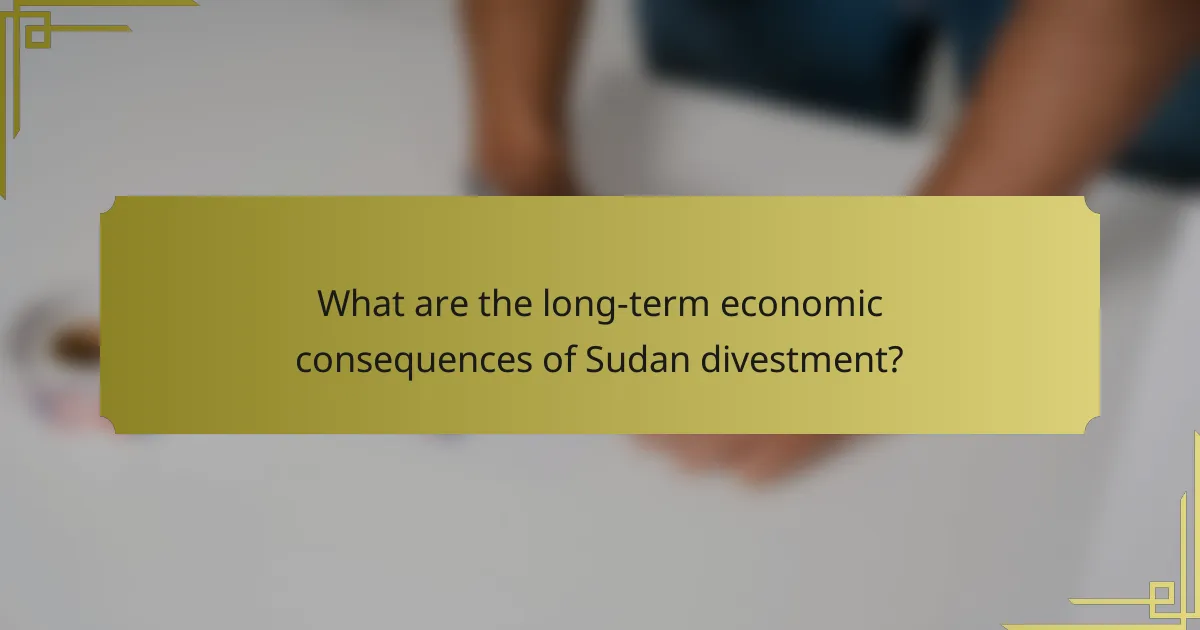
What are the long-term economic consequences of Sudan divestment?
Sudan divestment leads to significant long-term economic consequences. It results in decreased foreign investment, which destabilizes the economy. Companies withdraw due to concerns over human rights violations. This withdrawal reduces capital inflow and job creation. The economy becomes more reliant on domestic resources, which are often insufficient. Additionally, divestment can lead to increased inflation and currency devaluation. Historical data shows that similar divestment actions in other countries resulted in prolonged economic downturns. For instance, divestment from South Africa during apartheid led to international isolation and economic stagnation.
How does divestment shape Sudan’s economic recovery prospects?
Divestment negatively impacts Sudan’s economic recovery prospects. It leads to reduced foreign investment, limiting access to capital. Fewer investments hinder infrastructure development and job creation. Additionally, divestment can result in decreased trade relationships. This further isolates Sudan from global markets. Historical data shows that countries facing divestment often struggle economically. For instance, Sudan’s GDP has been affected by international sanctions and divestment trends. Overall, divestment creates significant barriers to Sudan’s recovery efforts.
What strategies can Sudan implement to mitigate the effects of divestment?
Sudan can implement several strategies to mitigate the effects of divestment. First, diversifying its economy is crucial. This can reduce dependence on specific sectors that are vulnerable to divestment. Second, attracting foreign investment through improved regulatory frameworks can create new economic opportunities. Third, enhancing local industries can build self-sufficiency and resilience against external pressures. Additionally, fostering partnerships with international organizations may provide financial and technical support. Finally, promoting transparency and good governance can restore investor confidence. These strategies collectively aim to stabilize Sudan’s economy in the face of divestment challenges.
What lessons can be learned from Sudan divestment?
Sudan divestment teaches the importance of ethical investing. It highlights the impact of financial decisions on human rights. Divestment can pressure governments to change policies. For example, in the early 2000s, divestment campaigns aimed at Sudan linked financial actions to improved conditions. This led to increased awareness of the Darfur conflict. It also demonstrated the effectiveness of grassroots movements. The success of such campaigns can inspire similar actions in other regions. Ultimately, Sudan divestment emphasizes the power of collective financial responsibility.
How can other countries approach divestment based on Sudan’s experience?
Countries can approach divestment by analyzing Sudan’s historical context and strategies. Sudan’s experience shows the importance of coordinated international pressure. Countries should assess Sudan’s economic ties and identify sectors vulnerable to divestment. Targeting specific industries can amplify the impact of divestment efforts. Additionally, engaging with local civil society can provide insights into effective strategies. Monitoring the outcomes of divestment in Sudan can inform future actions. Countries should also consider the potential economic repercussions of divestment on local populations. Implementing a phased approach allows for adjustments based on real-time results.
What best practices should be considered for future divestment initiatives?
Future divestment initiatives should prioritize strategic planning and stakeholder engagement. Clear objectives must be established to guide the divestment process. Comprehensive risk assessments should be conducted to evaluate potential financial and reputational impacts. Transparent communication with stakeholders is essential to maintain trust and support. Monitoring and evaluation mechanisms should be implemented to assess the effectiveness of the divestment. Collaboration with experts can provide valuable insights and best practices. Legal compliance must be ensured to avoid potential liabilities. Finally, aligning divestment goals with broader social and environmental objectives can enhance the initiative’s overall impact.
Sudan divestment refers to the withdrawal of investments from companies operating in Sudan, primarily driven by concerns over human rights violations, particularly during the Darfur conflict. This movement gained traction with the enactment of the Sudan Divestment Act in 2006, aiming to pressure the Sudanese government for policy changes. The article discusses the historical context, key organizations involved, and the significant economic implications of divestment, including its effects on foreign investment, employment rates, and the overall economy of Sudan. It also explores the moral and ethical considerations surrounding divestment and outlines strategies for mitigating its adverse effects.
